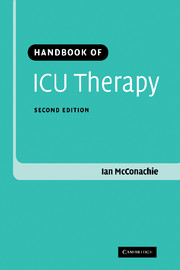Book contents
- Frontmatter
- Contents
- List of contributors
- Preface
- Part I Basic principles
- Part II Specific problems
- 17 The surgical patient in the ICU
- 18 The trauma patient
- 19 Acute coronary syndromes
- 20 Heart failure
- 21 Arrhythmias
- 22 The patient with sepsis
- 23 Acute renal failure in the critically ill
- 24 Acute lung injury and ARDS
- 25 The patient with gastrointestinal problems
- 26 The comatose patient
- 27 The critically ill asthmatic
- 28 The critically ill diabetic
- 29 The cardiac surgical patient in the ICU
- 30 Cardiac arrest
- Index
25 - The patient with gastrointestinal problems
Published online by Cambridge University Press: 24 August 2009
- Frontmatter
- Contents
- List of contributors
- Preface
- Part I Basic principles
- Part II Specific problems
- 17 The surgical patient in the ICU
- 18 The trauma patient
- 19 Acute coronary syndromes
- 20 Heart failure
- 21 Arrhythmias
- 22 The patient with sepsis
- 23 Acute renal failure in the critically ill
- 24 Acute lung injury and ARDS
- 25 The patient with gastrointestinal problems
- 26 The comatose patient
- 27 The critically ill asthmatic
- 28 The critically ill diabetic
- 29 The cardiac surgical patient in the ICU
- 30 Cardiac arrest
- Index
Summary
Gastrointestinal (GI) disease may be the primary reason for admission to the intensive care unit (ICU).
The GI system may also become involved in multiple organ failure, whether as source or victim is still a matter of debate.
The gut as the propagator of systemic inflammatory response syndrome
During critical illness GI perfusion may become compromised resulting in tissue hypoxia. This in turn leads to mucosal damage and disruption of the mucosal barrier allowing pathogens and/or toxins to access the circulation.
The liver normally removes these substances from the portal circulation but this leads to an inflammatory response with the production of cytokines and initiation of systemic inflammatory response syndrome (SIRS).
The gut is particularly sensitive to reperfusion injury, which results in the production of oxygen-derived free radicals.
The opposing view is that the gut is an innocent bystander in shock. GI dysfunction may simply reflect the development of organ failure rather than precede it.
The gut as a source of infection
The GI tract forms a portal to the external environment. Within it is over 400 species of microbial organisms. Ordinarily they cause no problems; indeed they are an essential component of normal host defences:
In the critically ill patient, however, they may become the source for nosocomial infections and sepsis.
Colonisation of the upper GI tract and oropharynx occurs with the same species isolated in nosocomial infections, particularly ventilator-associated pneumonia.
- Type
- Chapter
- Information
- Handbook of ICU Therapy , pp. 348 - 364Publisher: Cambridge University PressPrint publication year: 2006

